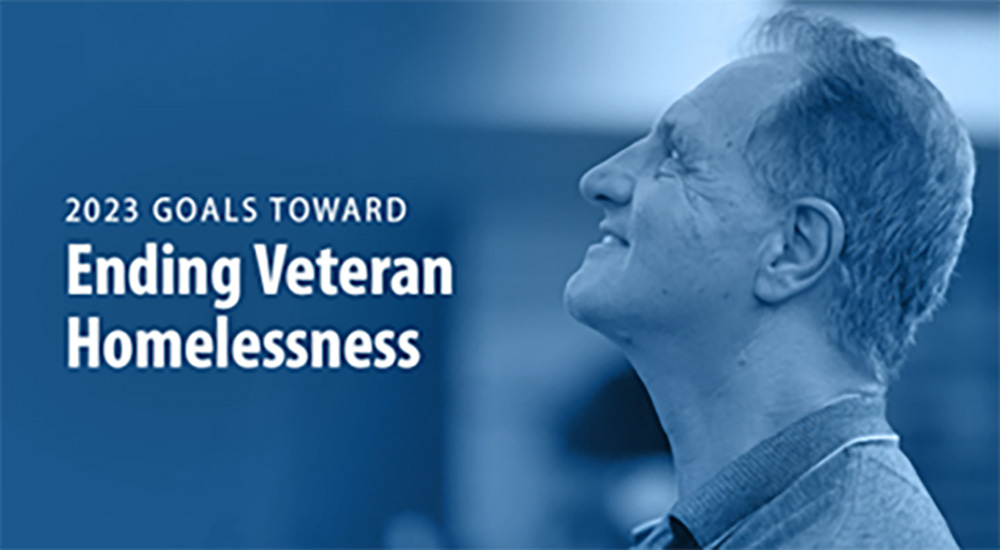Housing more than 40,000 homeless Veterans last year was an important step toward ending Veteran homelessness. Yet, as VA staff celebrated what was described as, “A win for our Veterans, VA and America,” they also wondered, “What’s next?” As long as one Veteran is without a place to call home in the country they served, there is work to be done.
2023 goals
To continue the critical mission of preventing and ending Veteran homelessness in America, in 2023, VA will:
- Place at least 38,000 more Veterans experiencing homelessness into permanent housing.
- Ensure that at least 95% of the Veterans housed in 2023 do not return to homelessness during the year. And of those who return to homelessness, VA will ensure that at least 90% are rehoused or on a path to rehousing by the end of 2023.
- Engage with at least 28,000 unsheltered Veterans to help them obtain housing and other wraparound services. This goal represents a more than 10% increase in the number of unsheltered Veterans reached during 2022.
Just as in 2022, VA will aim to place at least 38,000 Veterans into permanent housing this year.
Goals will be impactful, sustainable
VA’s goal is to deliver more care and more benefits to more Veterans than ever before.
When setting 2022’s goal to place 38,000 Veterans into permanent housing, we found that increasing the number of national permanent housing placements by 5% from 2021 was ambitious, yet achievable.
As the overall number of Veterans experiencing homelessness in America has declined in recent years, aiming to house 38,000 more homeless Veterans in 2023 is still a target that will be both impactful and sustainable.
“Permanent housing is a journey”
This year’s goals will expand upon 2022’s efforts with an additional emphasis on preventing returns to homelessness.
Of the 40,401 Veterans housed by VA in 2022, 2,443 returned to homelessness at some point last year, and 86% of those Veterans were rehoused or on a path to rehousing by the end of the year with the help of VA and community partners.
“We sometimes say that permanent housing is a journey,” said Jill Albanese, director of clinical operations and senior advisor for the VHA Homeless Programs Office. While the term “permanent housing” implies Veterans are placed into stable, long-term arrangements that are not transitional, the term “permanent” does not necessarily mean the Veteran remains in the same housing arrangement forever.
Some Veterans may move to new cities or states, often to be closer to family or for a new job, while others can experience changing medical or financial circumstances that make a new living arrangement necessary.
Outreach to unsheltered Veterans
The final component of this year’s goal focuses on increasing the outreach and services provided to unsheltered Veterans.
Unsheltered homelessness is when a person has a primary nighttime location that is typically not a place where individuals sleep, such as streets, vehicles or parks.
While unsheltered homelessness declined by nearly 56% between 2010 and 2022, 41% of all homeless Veterans were unsheltered in 2022.
In a special episode of the Ending Veteran Homelessness podcast, Director of Communications and host Shawn Liu asked, “Can we do this?”
Learn about VA programs
- If you are a Veteran who is homeless or at risk for homelessness, call the National Call Center for Homeless Veterans at 877-4AID-VET (877-424-3838).
- Visit the VA Homeless Programs website to learn about housing initiatives and other programs for Veterans exiting homelessness.
- Check out the Ending Veteran Homelessness podcast to learn more about what VA is doing about Veteran homelessness.
- Learn about how to get involved with housing homeless Veterans.
- For more stories like these, subscribe to the Homeless Programs Office newsletter to receive monthly updates about programs and supportive services for Veterans experiencing or at risk of homelessness.
Topics in this story
Link Disclaimer
This page includes links to other websites outside our control and jurisdiction. VA is not responsible for the privacy practices or the content of non-VA Web sites. We encourage you to review the privacy policy or terms and conditions of those sites to fully understand what information is collected and how it is used.
More Stories
The Medical Foster Home program offers Veterans an alternative to nursing homes.
Watch the Under Secretary for Health and a panel of experts discuss VA Health Connect tele-emergency care.
The 2024 National Veteran Suicide Prevention Annual Report provides the foundation for VA’s suicide prevention programs and initiatives.







I hope to use this program to better myself and the overall betterment to my community as well.
I am in the Atl,GA area and I am a 86 yr old amputee (lf leg bk) vet.I am totally independent.I do req a handicap equipped apt.I have been looking for over a year.I have contacted over 16 senior housing complexes and 67 privately owned apt facilities,all to no avail.I totally frustrated & depressed
WHY WON’T THE VA DO MORE TO PREVENT VETERAN SUICIDE? Great they are working on Veteran homeless but if they are dead they don’t need a house.
It honestly shouldn’t be a homeless VA at all in this country and it’s a lot of us. I’ve been asking around for months for help and we just get the run around. I’m currently facing eviction now because of the lack of help we receive. We should have someone who will help us with these calls and get the information we need to expedite the process before we just give up and lose everything including our minds. I’m honestly tired of making calls just to get referred somewhere else to be told to call another place. Should help reduce our stress. I hope things get better soon and fast before more families are facing what I’m currently dealing with now.